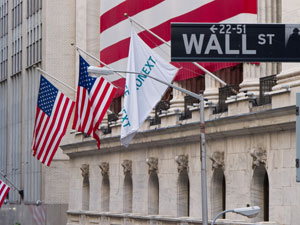Wall Street is full of adages, superstitions, and myths - and that includes answers to the question: Why is the stock market closed on Good Friday?
The New York Stock Exchange, aka the Big Board, has been closed every Good Friday for more than 150 years, with the exception of 1898, 1906, and 1907. The Friday before Easter is the only non-federal holiday among the exchange's nine closed days.
 The story that's been spread for decades is that Wall Street gets the day off because of its association with a couple of notable stock market crashes, not simply because it is a Christian holy day.
The story that's been spread for decades is that Wall Street gets the day off because of its association with a couple of notable stock market crashes, not simply because it is a Christian holy day.
I even called my Catholic father, a retired American Stock Exchange vice chairman, governor, and 35-year ASE stock specialist, who followed in the career path of his father and grandfather, for his take on the Good Friday closing.
"Whenever there was talk about opening the exchanges on Good Friday, which did come up over the years, it was quickly shot down," he said. "We all knew to do so was just courting bad luck."
But what's funny is there never was a big crash to blame for Good Friday's bad luck.
Get Your Buy List Ready: COVID-19 has crushed markets, but stocks will bounce higher. This is a once-in-a-lifetime chance to get into great companies at historically low prices, so put these stocks on your buy list now...
UBS's Art Cashin explained in 2011:
"The myth contends that the NYSE opened on a Good Friday and the terrible Black Friday occurred," Cashin wrote. "Thus, chastened and shaken, the Governors vowed never to open on a Good Friday again."
But, Cashin added, "it never happened."
Here are the crashes that catch the blame for closing the stock market on Good Friday...
The Gold Market's Black Friday Crash
The infamous and calamitous Black Friday crash did occur in Wall Street's early days, but it was the gold market principally affected, and it happened on Sept. 24, 1869, not Good Friday.
The painful plunge transpired thanks to two known "scoundrels," Jay Gould and Jim Fisk, who had a history of engaging in stock market scams.
The pair amassed a massive amount of gold, enough to "corner" (having the greatest market share without a monopoly) the market. The twosome began buying as much gold as they could starting on Sept. 20, 1869, with the aim of sending the precious metal's price higher. And, it worked. Gold rose from $130 an ounce to $160.
They hoped they could convince President Ulysses S. Grant to hold on to the government's gold stash, which he had been mulling selling for greenbacks to goose the economy. Meanwhile, Gould and Fisk were getting ready to sell their holdings for a tidy profit. They recruited financier Abel Rathbone Corbin, who happened to be married to Grant's sister, Virginia, to help with their efforts.
Grant, however, soon got suspicious amid all the family chatter about gold. When he found a letter from his sister to his wife discussing Corbin's involvement, a furious Grant ordered the sale of $4,000,000 in government gold.
The price of gold plunged minutes after the government's gold hit the market. Investors raced to sell their holdings, much of which had been obtained via loans. With no money to repay the loans, many were ruined.
This market crash isn't the real reason why the stock market is closed on Good Friday. But it's a good tale, and it's one of two stories that often takes the blame.
The other myth is the "Rich Man's Panic" of 1907, occurring during the last year the markets opened on Good Friday.
The Rich Man's Panic of 1907
The Rich Man's Panic of 1907 was a financial crisis stoked by several events.
A great deal of the blame is placed on the outsized role played by J.P. Morgan and the banking system. (Hmm, sounds familiar...)
[epom key="ddec3ef33420ef7c9964a4695c349764" redirect="" sourceid="" imported="false"]
Events leading up to the 1907 panic included stresses on the American money supply due to reconstruction aid flowing into San Francisco after the 1906 earthquake. Next came an interest rate hike from the Bank of England amid British insurance companies shelling hefty amounts to American policy holders.
Then came the Hepburn Act, allowing the Interstate Commerce Commission to set maximum railroad rates, which resulted in the depreciation of railroad securities (the "it" securities at the time).
What followed was a slide of nearly 18% in the New York Stock Exchange that reached a peak in March 1907. Good Friday that year was March 29, the last trading day of the month.
Traders took it as a sign from above. According to Bloomberg, Irish Catholic traders said at the time, "We told you not to open on Good Friday."
But the real reason the market is closed on Good Friday has more to do with the fact that there have been many Irish Catholic chairmen and Irish Catholic traders in the exchange's history that were expected to be in church on Good Friday. And church-going meant that demand and trading activity would have been light on Good Friday.
And for the years the market was open on Good Friday: In 1898, the Dow fell only one half point. In 1906 and 1907, the Dow rose...
So, even if a crash is unlikely to occur if it did open Friday, the stock market will close today (Thursday) at 4 p.m. and reopen Monday, April 6, at 9:30 a.m.
Our Complete Guide to Protecting Your Portfolio from the Coronavirus will help you navigate anything that comes next in this uncertain market. Click here to get this critical information right now, for free…
Related Articles:


